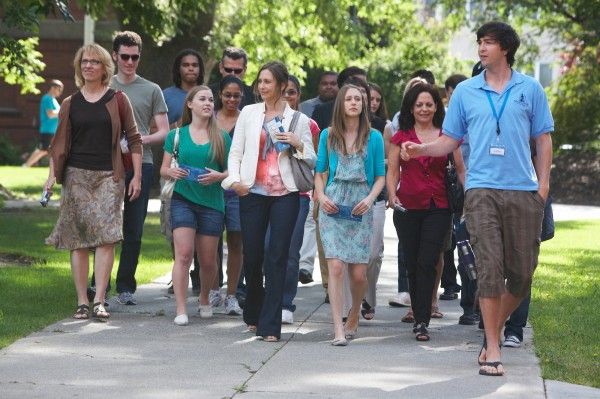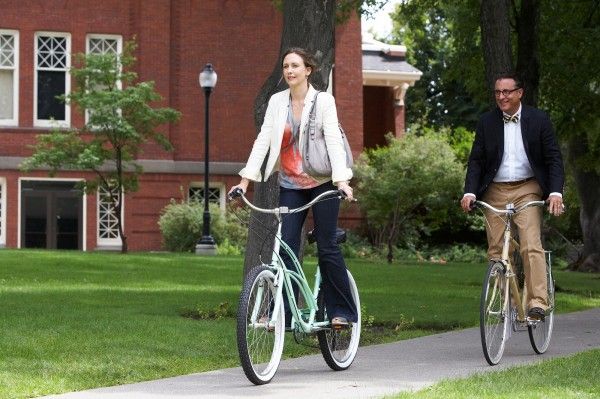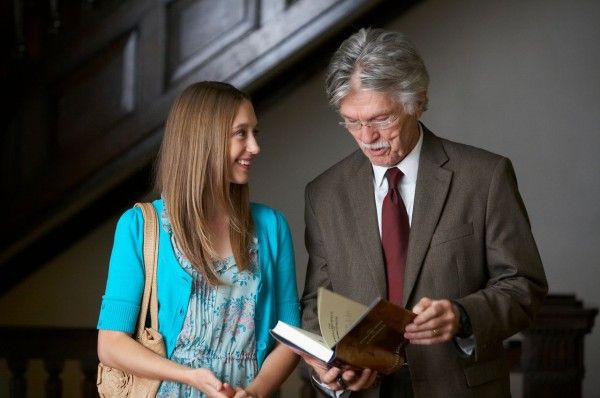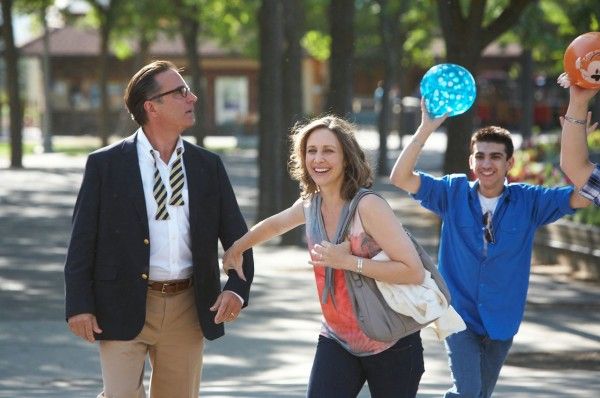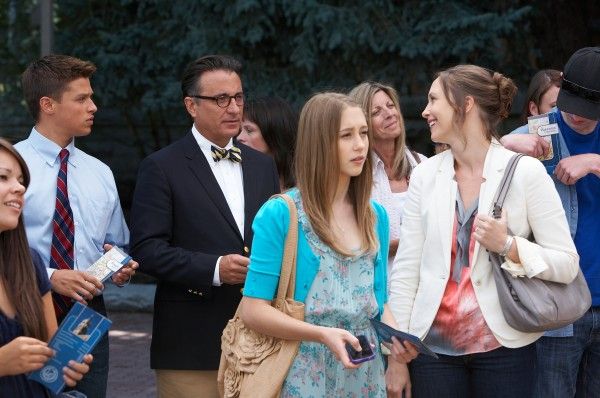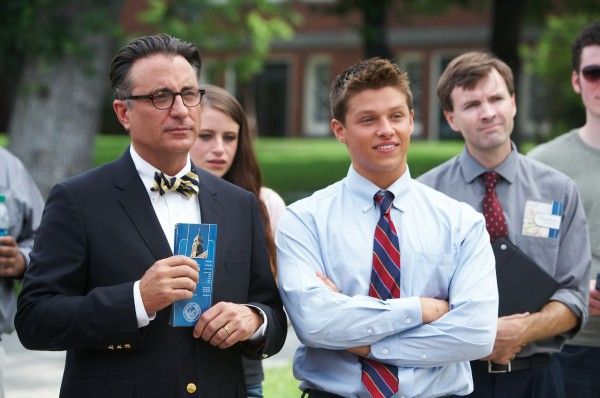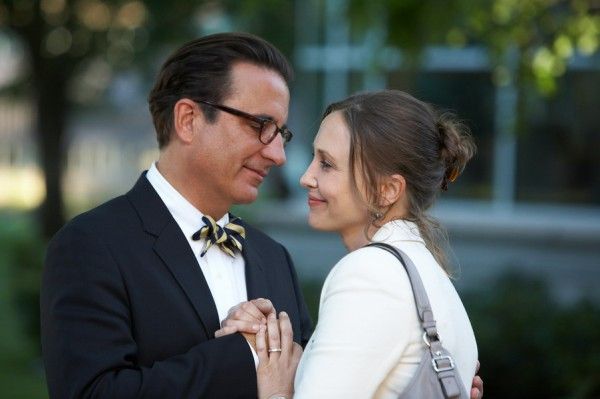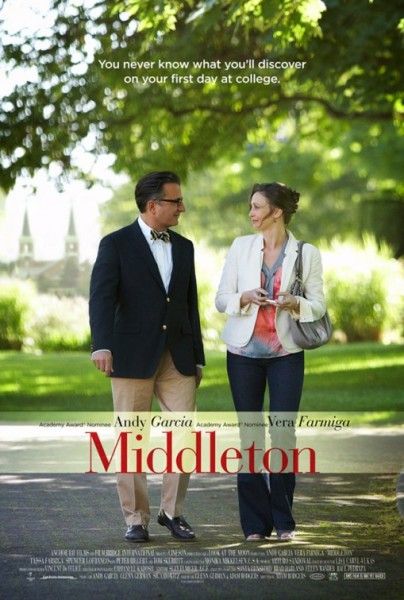At Middleton is both a light-hearted romance for adults and a deeply moving portrait of roads not taken and the timelessness of youth. Andy Garcia and Vera Farmiga star as straight-laced George and eccentric Edith, two strangers who meet on their children’s campus tour at the idyllic Middleton College. Failing comically to connect with their kids, George and Edith play hooky and ditch the official tour for a carefree adventure of their own. Opening January 31st, the romantic film directed by Adam Rodgers from a script co-written with Glenn German also stars Taissa Farmiga, Spencer Lofranco, Peter Riegert and Tom Skerritt.
At a recent roundtable interview, Farmiga, Rodgers and German talked about the challenges they encountered making an indie film, how the project came to life once Garcia was onboard, why Farmiga wanted the role the moment she read the script, her reaction to having her kid sister play her daughter, how a solid script and good chemistry resulted in strong performances, and their experiences directing their first feature films. Farmiga also discussed the upcoming Season 2 of Bates Motel and her new film The Judge with Robert Downey Jr. and Robert Duvall. Rodgers revealed the indie scripts he and his writing partner currently have in development. Check out the interview after the jump.
QUESTION: How did you get attached to the script? What was the genesis?
VERA FARMIGA: A FedEx truck delivered the script with an offer saying that Andy Garcia was attached to play George. I think there was some sort of a deadline, like a 48-hour time limit to the offer, which I thought was a really savvy and ballsy way of saying, “This is a good script. If you don’t like it, we’re going to go find someone else.” Just out of the gate, I read it and I knew this was a role I could run with. The characterizations were so vivid. They leapt off the written page like 3D pop offs. Man, I just wanted to have fun.
I grew up watching Carol Burnett do her schtick and I just was aching for something. At the same time, for the first time, I read the script and I thought, “Oh! Okay. I understand now why my mom cried filling out the Parents PLUS Loans for the university.” I get it now. I have a kid. He just turned five two days ago. He’s not even in kindergarten yet, and I have the pangs of withdrawal and letting him go, and even at the ripe age of five years wondering if I’ve girded him with enough to send him on his way.
It was a really touching script. I have tremendous respect for Andy ever since seeing When a Man Loves a Woman. That lingered with me, his performance there. I’d seen him in The Godfather and I thought, “Yeah, he’s a soulful dude.” At that point, I didn’t even anticipate becoming an actress. I wanted to be an ophthalmologist. I remember seeing the film and saying, “Oh! If I could only find me a man to love me with that sort of tenderness and patience and willingness and openness and commitment.”
Did you?
FARMIGA: I did! And also, the script is about these encounters we have for all of us at some point in our lives, that little flame that kind of dwindles or runs dry. It’s about these encounters with other human beings that make that flame ignite. My husband was that for me, and then my children became that for me as well the day I gave birth. It resonated profoundly from this place of identity and parenting.
Adam and Glenn, can you talk a little bit about how long it took for the project to come together? I understand it took several years?
GLENN GERMAN: Yes, it did. We typed “The End” in 2007 and we shot in the summer of 2012. It was about five years, which isn’t terribly long in independent years, but it was a battle. And then, as Adam says, we had all the clichés that are associated with independent filmmaking. We went through them all. We lost financing. We lost talent.
ADAM RODGERS: Multiple times.
GERMAN: We lost locations. We lost state incentives. But at the end of the day, it’s one of those things that nobody looks at the movie and says, “Oh this would have been so much better of a movie if you’d had this actor or that actor.”
RODGERS: Or if we’d shot it in Mississippi.
GERMAN: In Ole Miss, yeah. It’s life as a Vera Farmiga/Andy Garcia movie and we’re thrilled to death that that happened.
RODGERS: The story began when I took a college tour with my father when I was 17 through 8 or 10 colleges and I got really burnt out just like Conrad (Spencer Lofranco) in the movie. In the middle of one of these tours, I saw this girl who had wandered away from the tour. My 17-year-old self just drifted over to her and we played tour hooky for an afternoon. When I met Glenn and we started writing together, we talked about this idea and it kind of percolated. And then, we just got really old (laughs) and thought, “Let’s make it about the parents instead. It’s much more interesting.” We were 40 with kids and we were like, “Okay.” But that allowed us to do what Vera was talking about. It’s the joy and the mystery of meeting a new person in this new place, but also the pain of letting go.
FARMIGA: That transition. Absolutely.
RODGERS: That allows for the comedy.
Vera, you were shooting this in 2012 right after you directed your first feature movie, Higher Ground, or not too long after. And Glenn, this is your first feature movie. Did you guys talk about the experience of making your first movie?
FARMIGA: (joking) Not really. Not at all. I don’t know. I may have.
RODGERS: (laughs) There’s one very funny moment when you came to me. We had a wonderful cinematographer named Emmanuel Kadosh who worked with Andy (Garcia) before. He was like a magician with these beautiful set-ups.
FARMIGA: He hardly relied on lighting. He mostly used natural light.
RODGERS: You came over and whispered to me, “I think I used to many lights on my movie.” He was amazing.
FARMIGA: (referring to the movie she directed) Too many lighting set-ups and we took a lot of time with it.
GERMAN: When they say they didn’t get a chance to share ideas, literally it’s like they came in on a Saturday and met, and then we were shooting on a Monday. Although that was largely a product of our budget, I think for our movie it really was a very happy accident, because as Andy and Vera were getting to know each other, so were George and Edith. We got to watch it and point a camera while that was happening.
FARMIGA: In hindsight, now I realize I didn’t even afford you the luxury of rehearsals. I put a kibosh on that immediately. At the time, I had a one and a 3-year-old and I’d just come from shooting the crazy Conjuring. I was depleted and terrorized by researching negative mysticism, and at this point I wanted something fun. I remember you saying, “Shall we get together?” and I said, “Sure,” and I remember meeting Andy and recognizing that sense of whimsy behind him. You meet Andy and he’s so debonair. He’s really a first-class guy. He fuels himself with goodness. I remember it was at a costume meeting that we had met.
RODGERS: Yes. To be honest, you’re told so many things when you’re a first-time director. There are a zillion books, first of all. And everybody’s got advice about what to do. I had made a lot of short films, but the truth is I was kind of relieved, to be honest (laughs), because there’s nothing more awkward than sitting around a table with a script and trying to do comedy. This was very physical. So I think it was perfect that you said that.
FARMIGA: The thing is with Taissa (Farmiga), and having Taissa play my daughter, it is so relevant to who we are to each other and who we have been to each other. She’s a surrogate daughter of mine. I’d like to think that I’ve modeled for her what it means to take risks and be optimistic and what’s scary and what’s not. It was a time in life when she was just turning 18, and she’d just had a certain measure of success with Higher Ground and was given so much opportunity. I could see her fluttering away from me and at the same time needing me, and she still does. She was at the Golden Globes. (Laughs) I was at home watching her at the Golden Globes. She’s texting me, “Who’s Warren Beatty?” She goes, “I’ve Googled him and I can tell you the short things that I’ve learned about Warren Beatty, but the fact is I have a meeting with him at 8:30. Can you give me the low-down?” “Okay.” So she still needs me and I love that, but this was the last quality time I’ve spent with her. She’s off in New Orleans having a life. But this was like I was watching. She’s the last of my mom’s seven children. It’s the empty nest syndrome and I’m seeing it unfold. Taissa wanted her time on set. My mom’s not a stage mom. She never was, but she was a chaperon for Taissa. What’s she going to do? Sit at the hotel room? So she’d come to set, but I’d seeTaissa…
RODGERS: Bristling.
FARMIGA: Or just condemning my mom to trailer life and not allowing her on set because it’s that time for her to expand and grow, and that’s a very tender time of transition where parents have to learn how to let go and kids have to let go of their parents. I was witnessing my mom and Taissa go through it and at the same going through it myself because this is my kid sister. She used to babysit for me. Why aren’t you available to babysit anymore?
Did you do any improvs with Andy or did you stick pretty much to the script?
FARMIGA: There’s carefreeness in the script. As far as all that chemistry goes, I’d love to take credit for it, but for me it’s one percent willingness and 99 percent writing. Everything was on the written page and they’ve got the hardest job. They start off with a blank page. Without that great writing, you’d just be powerless as an actor. It was a veritable playground. You just had to put on your grubbies and roll up your sleeves and indulge. But it was a playground. The script is a play. Sure, improvisation came at a point. I would say there was room for it, but we didn’t rely on it because it was solidly scripted. And then there would be things like, for example, the acting teacher was Mirjana Jokovic who led the class through physical relaxation, but that’s Adam’s direction as well. We used the theater at Washington State University. All the shenanigans in the beginning were because Adam’s direction was to walk in through the prop room and there’s a bazillion props.
RODGERS: Severed legs and typewriters and stuff.
FARMIGA: You’ve got to think especially when you’re establishing chemistry and whimsy and adventure that you’ve got to open yourself up and just be present. Often times, it feels like you can’t just repeat moments. You’ve got to find newness.
RODGERS: I wanted to add that actually Vera sometimes would go the other direction which is even better, because a lot of the script is about what’s not being said. There were sometimes where we had a line and Vera would just make a sound. Remember when you see Andy in the hall and you want to take him into the projection room and he’s like, “Why are you…? What do you want me for?” And you were just like…
FARMIGA: Not saying the line, but thinking it.
RODGERS: And that was really special, too.
Another aspect of the character that really stood out was how kind of childlike she was in her movements and everything. You mentioned earlier how people like Carol Burnett influenced you. Where were your inspirations for that?
FARMIGA: I like Lucille Ball, too. There are all these physical comediennes that have always delighted me. I think it’s really interesting. The great contradiction of Edith is the first profound thing she says. Here’s this carefree, energetic, passionate woman. Yet the first bit of truth she admits to is that she’s profoundly unhappy. It’s that dichotomy, that contrast of being so carefree yet so hampered by how she’s chosen to live life or not live it as the case may be.
You guys mentioned that there wasn’t much time for rehearsals. Did you shoot chronologically? And if so, did that help?
RODGERS: It was kind of a mash-up. I mean, there were some sequences that were chronological.
FARMIGA: It was, but I would say in my experience though that for the most part it seemed chronological, because we were on one campus and everything happens in daylight. To me, somehow I feel like we have shot it chronologically. The first scene was the bench scene, but for the most part I think that we could grow with our characters.
GERMAN: It was pretty close.
RODGERS: That’s right. Overall, the arc of it was chronological. Again, it was my first feature, but I imagine these things evolve in different ways every time. For us, first of all, it was beautiful weather. It was summer.
FARMIGA: No. You had to remind us though. You have to keep a tight leash sometimes because it’s easy to get to know Andy, and he’s just some guy who walks by your side and you can call a friend immediately in my experience of him. And so, once we started, it was like the snowball effect, and you had to remind us and say, “Whoa, whoa, whoa! You’re too trusting.”
RODGERS: Or “You’re having too much fun.”
FARMIGA: Yeah. “You’re having too much fun at this point.”
RODGERS: Like in the library scene. I remember that. We had outtakes. We just did the outtake reel and they’ve just met and they’re still [getting to know each other], but in a couple of takes they were just like [good friends]. You look at Andy’s face and his veins are popping out because he’s laughing so hard. It was hilarious but it was too much. We had to modulate it.
FARMIGA: Yeah. You had to modulate it. It’s true.
RODGERS: In terms of just the rhythm of the days, even on the set we didn’t rehearse. We just got it up and running and it felt very organic.
FARMIGA: It did and I never felt stressed for time. As little time as we had, I always felt like that. Maybe it was just because of the simplicity of the interactions with maybe two people and a guy riding a bike in the background. But otherwise, it was sort of a personal story between never more than two or three people at a time. I felt like it was a luxurious process even though it wasn’t. We could take our time. I had as many takes as I wanted and more.
RODGERS: You did this great thing, too, which I learned from you which is instead of backing it up to the beginning with a slate for each take, we’d be in the middle of a take and get through it, and then Vera would say, “Let’s just back it up. Give me another one here. Here. Watch this!”
GERMAN: And a lot of times they were so different because even if it was out of order a little bit, there had to be a very clear arc to the relationship in the finished film. When you’re shooting sometimes out of order, it’s tough to peg over the course of a day when you’re shooting it in 20 days where you need to be emotionally. The actors gave such wonderful choices in the editing room for Adam and Suzy (editor Suzy Elmiger) to be able to craft the perfect arc for the story. It was just a pleasure to watch.
FARMIGA: I’m better at gauging that since being in the editing room and having that experience of editing a film and making sure that I supply you with the right choices.
RODGERS: It’s like light blue, dark blue, royal blue.
FARMIGA: Or maybe the wrong choices but let me get it just in case it works. You don’t have to rewind a scene to the beginning and start all over again. You just have to have the courage to pick it up in that one moment, but it requires an editing brain. I think it does.
What about the piano scene with you and Andy? Was that originally written?
FARMIGA: It was written. Everything was written.
Did you know that they were piano players?
GERMAN: First of all, Vera played. There’s the one shot where you can see it. Andy didn’t play quite as much.
RODGERS: We have to tell the truth.
FARMIGA: Andy did. He’s a jazz pianist so he improvises everything. I am very studious. I’m actually more like George just naturally. I think Andy is more like Edith. I actually do think so.
RODGERS: That’s true.
FARMIGA: And certainly when we are asked about our colleges, our college testimonies will attest to the fact that we sort of crossed after we were cast.
GERMAN: There was some cross pollination.
RODGERS: That’s really true. We said we want to do Chopsticks, but again it’s got to feel spontaneous. Of course, Arturo Sandoval (the film’s composer), who wrote it for us, crafted it and it became this very complicated duet which Vera practiced.
FARMIGA: It is, but I wish you guys could see the words of the scene to every detail. It is basically to almost every gesture. It’s written. So it seems improvisational, but I can’t take credit for it because you wrote it impeccably.
RODGERS: Well that was the benefit of it taking five years to get financed. It’s true. We’d write a scene and we’d be like, “Isn’t this good?” and then a year later we’d be like, “This is crap. C’mon! We can do better than this.” We just kept refining it and refining it and bringing Vera and Andy in. So I think that was a benefit.
During the shoot, was there something that didn’t work and you had to go and say this is not quite right?
FARMIGA: Recall, recall. I have incredible short term memory. I’m sure there were plenty of moments. I think tone was always something that I relied heavily on you for to reign me in because I’ll go big. I’m not afraid to go big. If you give me an inch, I’ll go…
RODGERS: It was great that scene where you’re evading the campus security guards and limbs are flailing.
FARMIGA: I suppose tonally. I relied heavily on tone. It’s not often that I get a chance to do this. It’s just tone and getting the accuracy of tone.
RODGERS: I only remember one time in the cafeteria. There was so much going on, and we came up together with “head” versus “heart,” and you were like, “Okay.” But you were so prepared. It’s true. You were just so ready for action.
FARMIGA: There’s that big speech. There are some disabled moments where I felt like certain big speeches that were scheduled for three weeks later were pulled up early and then I had to sort of scramble. When you’re breastfeeding a child, you don’t have the same retention as you do when you’re not. There were some really inept moments where I thought, “Oh, if I had only one more day, I could have been better. It could have been deeper work.” There are a lot of insecure moments I could tell you about. I think tonally I always try to give options because I wasn’t entirely sure, and the more we explored the story, it became clear to me. It was like tone doesn’t matter. Just play the truth of the moment and that’s always accurate.
The movie is very much about the characters returning back to college and experiencing these youthful memories. If you could go back to college yourself for one day, what would you do or not do differently?
FARMIGA: Oh God, I was such a square in college.
Did you study acting in college?
FARMIGA: I did. I actually never went to my own orientation. Once I was enrolled, there was this orientation that you have, but way in advance. I never went to Syracuse. I did go to Elizabethtown College with my mom when I thought I was going to be a music therapist and then Villanova when I thought I was going to be an optometrist. As far as Syracuse, yes, I studied, and it was a last minute switch in my senior year. I just decided to take this fork in the road. I was playing varsity soccer and I was benched, and I had my heart broken in the same week and didn’t want to sit there forlorn. One of my best friends encouraged me to audition for the school play and I got the lead role. From there, I was just encouraged to do it. If my professors at this public high school in Hunterdon County, New Jersey hadn’t said to me, “You should reinvestigate what you want to do and think about...” At that point, they had a couple students who had gone to Syracuse University. It was like one of their remainder colleges that had a drama program that still had auditions open.
What are some of your fond memories?
FARMIGA: I was so square. I have absolutely no [recollection].
GERMAN: I think I would have asked out Renata Summer for dinner. I think she might have said yes, but I don’t know.
FARMIGA: Ah, cute!
RODGERS: That’s absolutely right. I think it’s a reflection. There’s a lot in this movie of things that you wish you had done or had done sooner. For me, it was like I spent the first two years still being that person I thought someone wanted me to be. It took a while to figure out what I wanted to do. That’s exactly right.
FARMIGA: I don’t know. I would not have worked as an air condition technician.
You’re a very famous working actress, so what are the biggest challenges of juggling wife, career, and mother?
FARMIGA: It’s just flat out challenging. It’s impossible to be… I’d like to think of myself as 100%. My role as wife and mother is the most demanding and the most challenging and the most gratifying role I could ever play. Right now I consider myself to be a full-time mom, and so, career after having kids is just second. And it comes second sometimes I feel because of my commitment to maternity and wifery. I feel like I’m not as prepared as I could be. I feel like I just wing it these days and I wing it to the best of my ability. And certainly, it deepens my work. But it’s just not the same priority.
Vera, what are you working on next that you’re excited for people to see?
FARMIGA: We just finished Bates Motel, Season 2 and that’s going to be very exciting. It’s ten new episodes and it’s coming out in March. I completed The Judge with Robert Downey, Jr. and Robert Duvall and that’s being edited together. Warner Bros. will put that out at the end of next year. And then, I’m promoting this film. Those are things to look forward to.
Adam, what are Glenn and you working on next?
RODGERS: We’ve got, let’s say, many irons in the freezer. There are some indie scripts that we’re trying to get up and running. There are several comedies and a little kid’s story. I mean, it’s always about keeping a lot of pots simmering. When we got to L.A., our goal was we wanted to work for the studios and we did that for about ten years. But I think we were so intoxicated by just getting to make our own film. I know we just can’t wait to try to do that again because you really are in charge. Our focus now is to try to get one of these (indie films) to boil over again. The economics of it are not bad. Everybody is making a lot less money up front, but if you can make a movie for two or three million dollars, there’s a real back end. If you can do that, you can make the movies you want to make. Vera is so great. She’s just so on another level. We really got lucky.
GERMAN: Andy is a fantastic producing partner and he’s our star. Andy and Vera were great together. Talk about an experience. I don’t care how good your script is or talented your performers are, you can’t legislate chemistry between a man and a woman. It wasn’t until we were on the set and shooting it and looking at it on the monitor and we were like, “Oh my God!”


